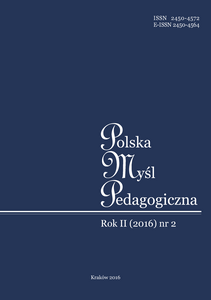Wstyd a rozwój moralny : o antropologicznych fundamentach neotomistycznej teorii wychowania moralnego
The sense of shame and moral development : about the anthropological foundations of the neo-Thomistic theory of moral education
Author(s): Jarosław HorowskiSubject(s): Metaphysics, Ethics / Practical Philosophy, Philosophy of Mind, Philosophy of Religion, Developmental Psychology
Published by: Wydawnictwo Uniwersytetu Jagiellońskiego
Keywords: shame; moral development; neo-Thomistic education philosophy; development of rational actions; discovering the value of human life;
Summary/Abstract: Shame is an unpleasant feeling man tries to avoid. However, representatives of neo-Thomistic education philosophy perceive shame as an important factor for moral development. The article presents the reflections of representatives of Neo-Thomism, i.e. Jack Woroniecki and Karol Wojtyla, on the role of shame in moral development. They relate shame to activities driven by the senses rather than by the intellect and reason. This is because the senses react to material good and the intellect recognizes moral good. Therefore, shame induces rational actions and at the same time induces acts which take into account moral good. Furthermore, shame warns against the threat of human dignity violation and therefore helps discover the value of human life. Thus, foundations for moral standards are created. The article presents philosophical and ethical assumptions of neo-Thomism; the interpretation of shame within the Neo-Thomism framework. The article also draws conclusions for educational theory and educational practice based upon the study of shame.
Journal: Polska Myśl Pedagogiczna
- Issue Year: 2/2016
- Issue No: 2
- Page Range: 231-244
- Page Count: 14
- Language: Polish

